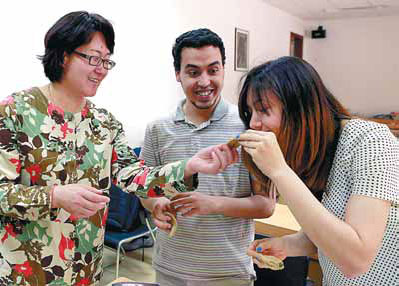Exchanges are the remedy for promoting TCM
Updated: 2013-06-17 07:58
By Jin Zhu (China Daily)
|
||||||||
|
Jia Dexian (left), deputy dean of the International School of Beijing University of Chinese Medicine, teaches students how to distinguish herbs. Feng Yongbin / China Daily |
Closer international cooperation is needed in the teaching of traditional Chinese medicine, according to industry analysts and insiders.
There is growing global demand for the treatments, and Canada is one of the countries set to hold national examinations for TCM students.
To practice acupuncture, hopefuls will have to pass the national exam and obtain a certificate from a specialist college in the province where they will work, said Du Huanbin, president of the Calgary College of TCM and Acupuncture in Canada.
"The upcoming national exam will better regulate TCM courses in Canada, and it also shows the country's government has realized TCM is a booming market," he said.
At present, only British Columbia, Ontario and Alberta have regulations covering TCM and acupuncture, he added.
Du, who is also a council member of the college and Association of Acupuncturists of Alberta, has 25 years' teaching and clinical TCM experience in Canada, China and Australia.
"There is a growing interest in natural medicine," he said. "In Canada, many people are dissatisfied with the healthcare system, with its long waiting lists and crowded environment."
In British Columbia, for example, acupuncture has been partly integrated into the healthcare system.
TCM is practiced in more than 160 countries and regions but in many places the teaching of TCM and acupuncture faces challenges.
"For instance, culture and language differences can impede the passing of knowledge," Du said.
There is also a lack of proper textbooks, he said.
Both Chinese and overseas TCM educators agree that closer cooperation and more exchanges are needed to promote the treatment and make it more acceptable to the world.
Fu Yanling, dean of the International School at Beijing University of Chinese Medicine, said he has considered setting up an association or alliance to gather TCM workers across the country to teach overseas students in English.
Fu invited TCM doctors who speak English fluently from hospitals in Beijing, such as Guang'anmen Hospital under the China Academy of Chinese Medical Sciences, to his classes with overseas students.
The school recruits about 130 overseas students every year - more than 60 percent from Southeast Asia - with the rest from the United States and Europe.
"For foreign students, it will take them time to study Chinese before they start to learn TCM," Fu said. "But Chinese is only a temporary language tool as most of them will be back in their countries to finish their studies."
Jia Dexian, deputy dean of the International School at Beijing University of Chinese Medicine, said she paid a lot of money to qualify to teach TCM in English.
She now has two classes in English a week.
"Although I'm not a native English speaker, years of teaching experience made me better understand the possible main difficulties for foreigners to study TCM," Jia said.
She said for overseas learners, her courses focus more on practical skills. "For many key words, such as the names of herbs and clinical symptoms, I always repeat them many times," she said.
Jia said TCM faces an uphill battle to gain more global popularity.
Ruzanna Beghanora, 23, from Turkmenistan, started a five-year TCM course at the Beijing University of Chinese Medicine this year. She said her grandmother is a neurologist who gives acupuncture treatment. "Her needles are old and thick but the treatments really work."
jinzhu@chinadaily.com.cn
(China Daily USA 06/17/2013 page3)

 Michelle lays roses at site along Berlin Wall
Michelle lays roses at site along Berlin Wall
 Historic space lecture in Tiangong-1 commences
Historic space lecture in Tiangong-1 commences
 'Sopranos' Star James Gandolfini dead at 51
'Sopranos' Star James Gandolfini dead at 51
 UN: Number of refugees hits 18-year high
UN: Number of refugees hits 18-year high
 Slide: Jet exercises from aircraft carrier
Slide: Jet exercises from aircraft carrier
 Talks establish fishery hotline
Talks establish fishery hotline
 Foreign buyers eye Chinese drones
Foreign buyers eye Chinese drones
 UN chief hails China's peacekeepers
UN chief hails China's peacekeepers
Most Viewed
Editor's Picks

|

|

|

|

|

|
Today's Top News
Shenzhou X astronaut gives lecture today
US told to reassess duties on Chinese paper
Chinese seek greater share of satellite market
Russia rejects Obama's nuke cut proposal
US immigration bill sees Senate breakthrough
Brazilian cities revoke fare hikes
Moody's warns on China's local govt debt
Air quality in major cities drops in May
US Weekly

|

|








